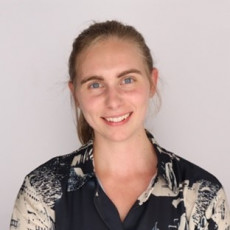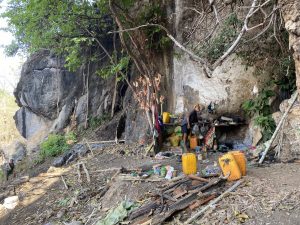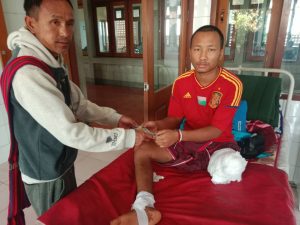“Hom” is a 23-year-old trans man who has stayed in Southern Shan State despite the constant fear of being picked up by officers to join the military. Hom’s anxiety is palpable as we speak on Zoom, even with his camera off to spare the limited electricity.
He tells us that he has already had to flee the military and PNA (Pa-O National Army, allied with the military and conscripting on its behalf) twice. Hom explains that in his home village, he is well-known for his activism and is targeted by the military for both his work with PYO and conscription. When he escaped, he told his village he was going abroad to Thailand, but instead he moved to a smaller village with his wife. Hom says that this village is safer because he’s less recognized and the fighting is farther away.
Still, Hom tells us wearily, he is constantly thinking about security, and he still attracts attention and scrutiny from his new neighbors. He presents as a man – a young man of fighting age. As a result, he says, people stop him to ask why he hasn’t been recruited by the military or, alternatively, joined a resistance militia (reinforcing the assumption that the binary choice is about who to fight for, not whether or not to fight). Meanwhile, the Burmese military – an extremely conservative and transphobic institution – does not recognize Hom as a man, so he is officially on the conscription list for women.
Since women are not yet being conscripted in his area, this discrimination has, in a way, bought Hom time, but it has not lessened his concern. He could still be arrested and forcibly recruited while walking down the street. He tells us that when he goes shopping in the city, he wears a helmet and mask to keep people from reporting him. Even at home, he says with a note of distress, he is plagued with nightmares of being arrested in the middle of the night.
He suspects women will be recruited in the next round, and I can hear his voice grow thick with emotion when he talks about how his wife will also be vulnerable to conscription then. She is one of the main reasons he has decided to stay in Myanmar instead of relocating to Thailand like his brother and many of his friends have done. Hom explains that his wife is not from Shan State, so she hasn’t been able to get a passport. And Hom quickly establishes that going anywhere without her is not an option.
He has already made the heart-aching choice to cut ties with his brother and restrict contact with his parents. Hom tells us that he hasn’t even accepted his brother’s Facebook friend requestion because he’s worried about their communication being tracked.
He does still speak with his father but has a strict protocol: Hom is always the one to initiate contact, preferably using a Thai phone number, and only at night. If his father is alone and at home, he’ll answer. Otherwise, he’ll ignore the call or run home to take it in private. Their biggest concern is that the others in Hom’s home village will ask questions and report that Hom is not abroad and can be arrested or conscripted.
He also worries about how he’ll be treated if he is forced into the military. Hom says he hopes they’ll treat him like a man, but if they find out he’s trans he’ll likely be harassed. Hopefully not assaulted, he says, that’s more likely for trans women, who, he explains earnestly, face more prejudice and discrimination than himself.
Despite all this, Hom tells us that he wants to go home, and I can hear his voice wobble with grief and exhaustion. He says he hopes the war will end soon, so he can make a life in his home village and finally sleep well again.
As we begin to wrap up the interview, Hom jumps in again to share a final sentiment that has come up in several other interviews: there are others suffering much more right now, and supporting them and their fight for freedom is essential. He says helping others through activism makes him feel brave and gives him hope, even if it puts him in more danger.
The name of the interviewee has been changed to preserve confidentiality.
Posted By Madeleine Schneider
Posted Jul 11th, 2024




3 Comments
Iain Guest
July 15, 2024
This fascinating post raises all kinds of questions for me! First, if Hom was born a woman but identifies as a man, I hate to think what would happen if he is forcibly drafted by a homophobic regime. That must add a whole new level of anxiety to his life, and to his wife’s. Really kind of terrifying to think of – I must say that Hom and his wife are very brave, and I admire their decision to stay in Burma. Second, do the rebel armies welcome LGBTQ recruits and treat them tolerantly – and if so, do we know how many may be fighting with the rebels? Third, does the policy vary among different ethnic peoples? This is certainly an unusual angle on conflict and peace-building. Any more insights would be most welcome, Maddy! (I’m also reminded of the way the US agonized over the “Don’t Ask Don’t Tell” policy introduced during the Clinton years.)
Mary Ellen Cain
July 22, 2024
Hom’s trans identity does add another level of complexity to an already complicated dilemma. If conscriptedm he knows the military would not treat him fairly and, even though his sympathies are with the resistance, he doesn’t really know if he would not be discriminated against by that group. Add on to that, his concerns for his wife and her inability to get a passport which means they can’t go to Thailand. At least he has the support of his family although very limited contact with them makes that difficult. And yet he still has concerns for others whose situations are even more severe. I hope you are able to follow up with him in the next few months.
Mary Ellen Cain
July 29, 2024
Such a thought-provoking blog about the added pressures members of the LGBTQ+ community face in this conflict. Hom and his wife are very brave to stay in Burma although they have little choice due to his wife’s difficulty getting a passport. Cutting most ties with his family and facing inevitable discrimiation whether he volunteers for the rebels or is conscripted, complicate his dilemma even more and yet he still has compassion for those worse off. I look forward to future reports on Hom and hope he will be able to find a good resolution to his predicament.